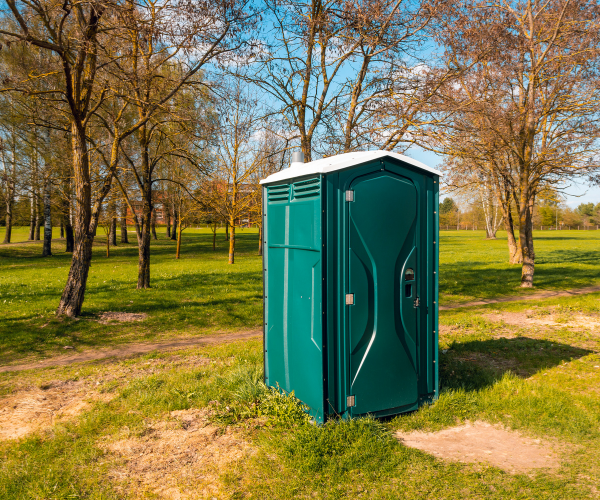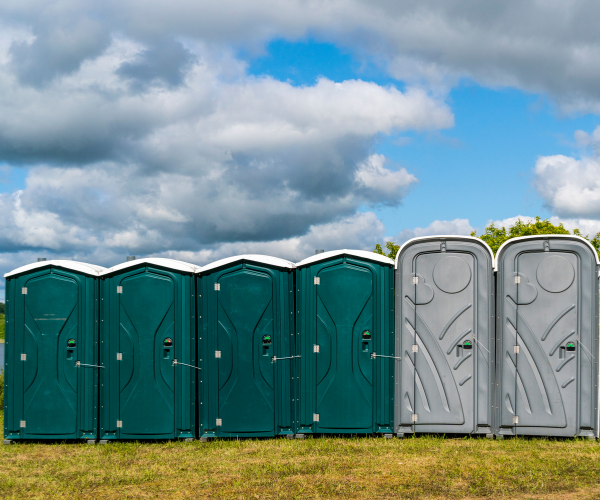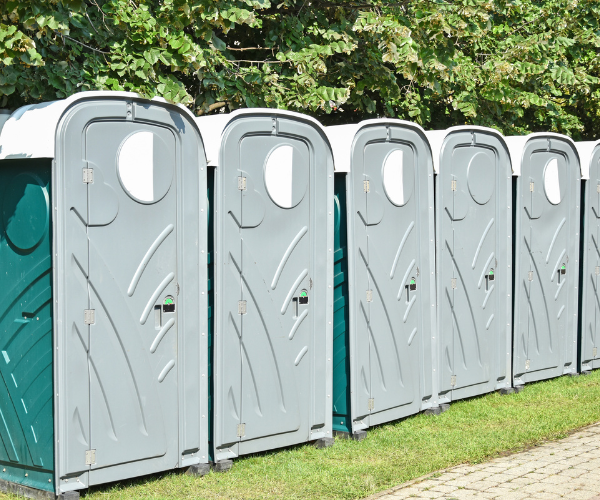The use of Portable Toilets presents several eco-friendly benefits that support sustainable practices. These units significantly conserve water, as they are designed to operate with minimal water usage compared to traditional flushing toilets. This conservation is crucial, especially in areas where water resources are limited. Portable Toilets also contribute to reducing pollution by safely containing waste and preventing it from leaching into the environment. The waste collected in these toilets is routinely processed in environmentally responsible ways, minimizing the risk of contamination. Another ecological advantage is their ability to lower energy consumption. With no need for electricity or plumbing, they save energy that would otherwise be necessary for sewage treatment processes. Beyond water and energy conservation, Portable Toilets help manage and reduce odor, thanks to the innovative use of eco-friendly deodorizers and chemicals. These additives ensure the breakdown of waste without harming the environment. They also play a role in reducing human impact on public or remote natural areas by providing a designated sanitation space, thus preventing unsanitary conditions that may arise from inadequate facilities. When hosting events or managing construction sites, choosing Portable Toilets can result in a reduced carbon footprint. Portable Sanitation Units lower fossil fuel consumption because their logistics and servicing are generally planned to be as efficient as possible, often reducing unnecessary vehicle usage. Embracing Portable Toilet solutions means not only accommodating human needs effectively but also supporting environmental stewardship.

Portable Toilet Rentals in LaGrange, Georgia
Call today for a free quote (770) 215-0134
Portable Toilet
Fast, Easy, & 100% Free To Get Started
Over 20 Years of Excellence
For over 20 years, our Portable Toilet company has been a committed part of the LaGrange community, delivering quality services tailored to ensure customer satisfaction. Our strong local connections allow us to offer personalized services that meet your specific requirements efficiently.
Premier Quality Service
Our Portable Toilet company takes pride in delivering top-notch quality service. Each unit is meticulously prepared and sanitized to meet the highest standards, ensuring a clean and pleasant experience for all users.
Swift and Reliable Delivery
We specialize in providing fast and reliable delivery for all Portable Toilet rentals. Our team is dedicated to prompt and efficient service, ensuring that our units are delivered on time to meet your event needs.
Convenient Portable Toilet Options in LaGrange
Call for a Free Quote Today
(770) 215-0134
Our Portable Toilet company in LaGrange is proud to offer dependable, reliable, and locally owned services to our community and its surroundings. With our stellar reputation for quality and cleanliness, we provide necessary accommodations for a variety of events, including construction sites, parties, festivals, and weddings. Our units are meticulously maintained and readily available, ensuring that your event is supported with the best sanitation facilities. Serving areas from LaGrange to the neighboring regions, our customer-first approach guarantees satisfaction. Choose us for your next event, and experience the ease and convenience that our Portable Toilet services bring.


Our standard porta john rental units are durable and reliable for any commercial build site, housing development, public works project, or remodel job.Features include dome lighting, grated floors, and an “In-Use” locking mechanism for privacy and comfort. Regularly maintained, inspected, and cleaned by FusionSite at your location.

Developed as an alternative to full ADA-compliant restrooms, the Liberty is a spacious, wheelchair-accessible unit that can also be promoted as a family-sized restroom. Includes a patented flat-floor system for easy wheelchair access and maneuverability.Handrails, paper holder, and rotary latch are designed for simple, intuitive end-user operation.

Portable hand washing stations are essential for keeping your work site sanitary and clean. Features hands-free foot pumps, liquid soap, and paper towels.Perfect for job sites without water hookups, these units can handle hundreds of washes between services.
We Proudly Serve
Standard Portable Toilets
Standard Portable Toilets in Georgia Container offer versatile sanitation solutions tailored for public or private events.
High Rise Portable Toilets
High Rise Portable Toilets provide accessible restroom solutions for high-rise construction projects across LaGrange.
Restroom Trailers
Restroom Trailers available at LaGrange's Georgia Container combine luxury and practicality for enhanced comfort at any event.
Roll off Dumpsters
Roll off Dumpsters from Georgia Container, LaGrange, deliver seamless waste management solutions for businesses and residences.
Septic Tank Cleaning
Georgia Container's Septic Tank Cleaning ensures efficient and environmentally friendly maintenance for residential systems.
Grease Trap Cleaning
Our Grease Trap Cleaning service in LaGrange ensures your kitchen's smooth operation and compliance with hygiene regulations.
Fencing & Barricades
Fencing & Barricades service at Georgia Container provides secure and robust solutions for events and construction sites.
Residential Storage
Residential Storage in LaGrange offers convenient and secure storage solutions for all your household needs.
LaGrange Portable Toilet and More
Getting a quote and delivery for a Portable Toilet in LaGrange through our service is as simple as it is efficient. We understand that time is of the essence, and that's why we've streamlined our process to ensure maximum convenience. To begin, visit our website where you will find easy-to-locate 'Get A Quote' buttons throughout our pages. With just a single click, you'll be directed to our user-friendly form, where we require basic information—your first name, last name, phone number, and email address. This intuitive design minimizes complexity, allowing you to complete your quote request in mere minutes. Once submitted, our dedicated team will review your information promptly and get back to you with a detailed quote tailored to your specific needs and event requirements. Should you have any questions throughout this process, our customer service team is readily available to assist via phone or email, ensuring you have a smooth experience from start to finish. Once your requirements are confirmed, our logistics team will coordinate the delivery at a time that suits your schedule, making sure the Portable Toilets arrive well ahead of your event. Our comprehensive approach emphasizes reliability and promptness, ensuring you can focus on what matters most—hosting a successful event. Whether you are planning a private party, festival, or need facilities for a construction site, our wide range of Portable Toilets and restroom solutions are designed to cater to any occasion. You can rest assured that our services are not just about rental; they are about providing complete peace of mind in terms of sanitation for you and your guests.

Experience the local charm of LaGrange while enjoying top-notch sanitation facilities with our Portable Toilets. Located near the picturesque grounds of Callaway Stadium and the annual thrill of the Sweet Land of Liberty Parade, our services are crafted to enhance any event, whether a bustling festival or an intimate gathering. Our focus on local appeal ensures your event maintains its unique character while providing essential conveniences. Event organizers in LaGrange trust us as their premier choice for Portable Toilets due to our commitment to cleanliness, dependability, and convenience. Our units are meticulously maintained to meet health standards, offering guests a worry-free sanitary experience. With our expert setup and prompt service, you can concentrate on keeping your guests entertained, while we handle hygiene with professionalism. Whether it's for a rustic wedding by the lakeside, a community get-together, or a concert in LaGrange's lush parks, our Portable Toilet services fit seamlessly into any occasion. The reliability and convenience of our services make us the preferred provider in LaGrange. Boost your event's success by selecting Portable Toilets that blend effortlessly with the natural beauty of LaGrange, and experience the benefits of partnering with a local, trusted service provider.
Why are we the best choice in LaGrange? We leverage local knowledge and premium quality to make your event truly unforgettable with our sanitary solutions. Our unwavering commitment to excellence has secured our reputation as the leading provider of Portable Toilets in the area. Our customer-focused approach, coupled with ongoing maintenance and dependable service, has made us a fixture in the local community. Familiar with LaGrange's unique character, we tailor our services to suit the diverse needs of our clients. Our dedicated team ensures punctual delivery and setup, maintaining top sanitation standards, establishing us as the preferred choice for any event. By opting for our Portable Toilet services, you align with a company that values the community and enhances every event with hassle-free logistics and exceptional service. Join our satisfied customers in LaGrange and experience why our units stand above the rest, delivering the most comfortable and reliable restroom solutions available.
Fast, reliable service is at the core of what we offer in Portable Toilet rentals. Our clients in LaGrange can depend on us for a seamless experience from quote to setup. Understanding the fast-paced nature of event planning, we ensure that our delivery schedule aligns perfectly with your timelines, offering peace of mind. Our team is committed to promptness and efficiency, handling every detail of the rental process to ensure your event proceeds without a hitch. The combination of our local knowledge and operational expertise empowers us to be the reliable choice for Portable Toilet services in LaGrange. With a focus on community engagement and satisfaction, we have refined our processes to be as streamlined as possible, delivering consistent quality to enhance your guest experience. Whether for a large-scale public event or an exclusive outdoor celebration, our Portable Toilets are always delivered promptly and set up with care. Choose us and encounter the ease of working with a provider that respects your time and values the success of your event.
Learn More About Our Portable Toilet in LaGrange
Renting a Portable Toilet in LaGrange is a straightforward process that incorporates convenience at each step. Start by visiting our website, where you'll find the 'Get A Quote' buttons placed strategically throughout. By clicking on one of these, you will be directed to our quote request form. This form is designed to capture essential details swiftly, asking for information such as your first name, last name, phone number, and email. Once you've submitted the form, our team promptly begins processing your request to provide a tailored quotation that meets your needs. We pride ourselves on rapid response times to ensure you can move forward with your planning efficiently. Following the quote's reception, a member of our team will reach out to confirm the details and finalize the rental. Our commitment to customer service is unwavering as we guide you through each phase, addressing any inquiries and custom requests you may have. Beyond the digital avenue, we are also readily available by phone, providing direct interaction with our experts should you seek immediate assistance. Our contracts are clear and concise, ensuring a smooth transaction process. With a focus on ease and clarity, we aim to be your trusted partner in sanitation solutions. Finally, our logistics team arranges timely delivery and set-up at your specified location. We coordinate with your schedule so that our Portable Toilets arrive when needed, ready to serve all your guests or workers. In choosing our service, you gain a dependable, stress-free solution backed by years of expertise in Portable Toilet rentals across LaGrange. This reliability ensures your focus remains on the success of your event or project.
The typical delivery timeframe for Portable Toilet orders varies depending on a few factors such as the number of units needed, delivery location, and the urgency of the request. Generally, we aim to deliver within 24 to 48 hours from the confirmation of your order. For more extensive events or construction projects, coordination with our logistics team ensures that your specific needs are met efficiently. In emergencies or last-minute requests, we strive to offer same-day delivery service when possible, thanks to our dedicated team and strategic resource management. Our close ties with the local community and thorough understanding of the logistics landscape in LaGrange empower us to meet tight deadlines consistently. Flexibility is a key component of our service strategy, enabling us to adjust based on customer demands and unforeseen circumstances, while maintaining punctuality. Every delivery is meticulously planned, starting from optimal routes to advance preparation by our trained staff. By choosing our company for Portable Toilet rentals, you enjoy a streamlined experience where reliability and professionalism are guaranteed. We recognize the importance of readiness in the context of event planning or construction management, and our prompt delivery service reflects this commitment. Regardless of where you are in LaGrange, our team delivers not only the units but an assurance of excellence you can count on.
Yes, we can service events and construction services of all types. Our comprehensive range of facilities is tailored to meet the demands of diverse occasions. We cater to major festivals, vibrant sporting events, and intimate weddings, ensuring seamless restroom solutions that enhance the overall experience. With our selection of luxury restroom trailers and convenient porta potties, your guests will enjoy unmatched comfort and sanitation. Corporates seeking facilities for large-scale events or family reunions will find our services adaptable and efficient. We provide roll-off dumpsters, enabling effective waste management to maintain a clean site. Additionally, our fencing and barricades offer robust safety solutions for any event layout. From ADA units ensuring accessibility to everyone, to portable sinks and hand sanitizer stations promoting hygiene, each feature is designed for maximum user satisfaction. Our holding tanks are expertly maintained, prepared for long-term projects or single-day events. Whether accommodating a small gathering or outfitting a construction site, our resources and expertise allow us to customize services to meet all needs. Our commitment to flexibility and reliability positions us as the preferred partner in Portable Toilet services.

